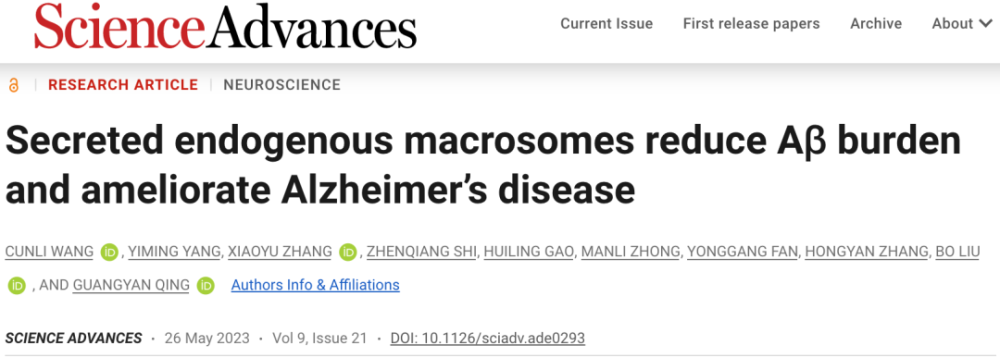
Recently, Professor Bo Liu from Dalian University of Technology Faculty of Medicine, in collaboration with researcher Qing Guangyan from Dalian Institute of Chemical Physics, Chinese Academy of Sciences and Gao Huiling from Northeastern University, has brought forward a new perspective in the treatment of Alzheimer's disease. A joint research paper"Secreted endogenous macrosomes reduce Aβ burden and ameliorate Alzheimer's disease" has been published in Science Advances.

At present, the main pathological features of Alzheimer's disease (AD) are senile plaques formed by extracellular β-amyloid protein (Aβ) and Tau protein neurofibrillary tangles. Commonly, Aβ peptide is taken as the objective pathological target, as its misfolding and aggregation are widely prevalent in the brains of patients with AD and initiate neurotoxic events including neuroinflammation, synaptic and neuronal loss, and tau-associated pathology. The failure of drugs to the treatment of AD is mainly attributed to unsatisfactory inhibition effect on the target, drug-associated side effects, inability to cross the blood-brain barrier, and neuroinflammatory responses. Thus, innovative strategies are urgently needed to develop effective therapeutics for AD compared to traditional therapies.
In recent years, extracellular vesicles have attracted much attention because they have the ability to cross the blood-brain barrier and excellent biocompatibility. Accordingly, therapeutic methods based on extracellular vesicles are emerged. In the study, small EVs and macrosomes were isolated from microglia, and investigated the therapeutic effect on the progression of AD. They found that macrosomes could inhibit the aggregation of Aβ peptide and ameliorate cognitive impairment in mice with AD, which provides a new perspective for AD treatment.
Cunli Wang, a 2020 Ph.D. student of DUT is the first author of the paper. Professor Bo Liu, and Researcher Guangyan Qing are the corresponding authors. The work is completed by School of Biomedical Engineering, Faculty of Medicine, Dalian University of Technology as the first unit, and supported by the National Natural Science Foundation of China.